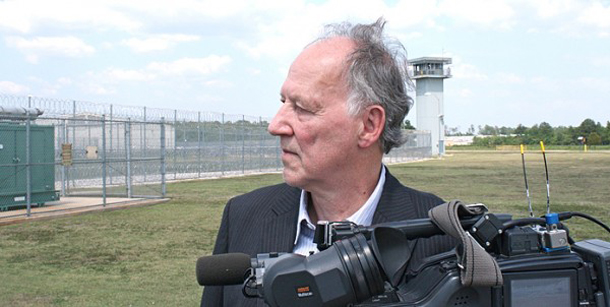"Please describe an encounter with a squirrel."
Only moments after the start of Into the Abyss and there it is -- the signal that we are not going to be seeing a typical documentary. We are entering Herzog country.
Werner Herzog has been a busy junge of late. His documentary Cave of Forgotten Dreams arrived in 2010 along with the documentary Happy People; 2009 saw two dramatic films, Bad Lieutenant: Port of Call New Orleans and My Son, My Son, What Have Ye Done? There have been a couple of documentary shorts too, and in 2012 a TV documentary, Death Row. Into the Abyss was released in 2011 and opens tonight at the VanCity Theatre with screenings all week. This documentary also takes us to death row, specifically the prison in Huntsville, Texas. But it does not necessarily take us where we expect. Because this is a Werner Herzog doc -- and every Herzog documentary is, to some degree, about Herzog. Which is generally not a bad thing.
The request for a squirrel anecdote, coming from off-camera in the director's familiar German accent, is put to a prison pastor in the opening scene. The pastor has been describing the role he plays, accompanying death row inmates into the chamber and staying with them even as they are strapped to the gurney and injected with lethal chemicals. Once prompted, he tells of driving his golf cart over a fairway and almost running over two squirrels. He stops in time and they run away to live another day. "Life is precious, whether it's a squirrel or a human being," he says, suddenly overcome. "For someone on the gurney I cannot stop the process... but I wish I could."
It's pure Herzog. Already he has subtly shifted the focus from his ostensible topic -- in this case capital punishment -- to his boundless fascination with human oddity. As in his classic 2005 film Grizzly Man, Herzog operates like a wildlife photographer probing the habitats of strange Americans.
Texas mean streets
The man on death row is Michael Perry, convicted along with Jason Burkett of an Oct. 2001 triple murder. Sandra Stotler, a nurse, was killed while baking cookies in her home so that Perry and Burkett could steal her Camaro. Two young men, Stotler's teenage son Adam and his friend Jeremy Richardson, were later killed just to get access to a gate opener. We meet the impossibly boyish-looking Michael Perry eight days away from his scheduled execution, looking and sounding rather like a high school quarterback talking about the big game next weekend. We wait to hear about the travesty of justice that has placed him in this horrible position.
But Into the Abyss isn't that film. Perry and Burkett both proclaim their innocence, but if there is any exculpatory evidence, Herzog doesn't present it (in fact, Perry later told a reporter of his distress at discovering Herzog didn't want to investigate his claims). Instead Herzog quickly leaves Perry and Burkett and focuses his attention elsewhere -- on the crime itself, the families of the victims, Burkett's convict father, and peripheral figures who crossed paths with the murderers. Into the Abyss shows us a world of violence and doom that, for all we know, might just be the regular run of life in Conroe, Texas.
Overstatement? Maybe. But consider that Lisa Stotler-Balloun, Sandra's daughter and Adam's sister (sort of -- it's complicated) has experienced so much loss in her life, including the violent loss of both parents and two siblings, that she got rid of her telephone. She simply got tired of the kind of news it brought.
Herzog interviews another young man who casually describes being stabbed with a very long screwdriver and shot at from close range with a pistol (it misfired). Burkett's dad is an habitual criminal whose impassioned courtroom speech is the only reason his son didn't also earn a death sentence from the jury. "Sittin' with my son on a prison bus," Burkett Sr. says. "It don't get much lower than that."
Herzog also introduces us to Fred Allen, a man whose longtime job involved shepherding death row inmates through their final hours. After performing that service for convicted murderer Karla Faye Tucker, Allen suffered a kind of breakdown and quit the job for good, losing his pension in the process.
Herzog's way
It's pretty clear that Herzog is anti-death penalty -- the unfairness is apparent in the different fates of the two men convicted for the same crimes. But he does not take the easy road of showing an innocent man on death row. Instead he shows us a guilty one. After all, if the death penalty is morally wrong, the issue of guilt is irrelevant.
Unlike many of his documentaries, Herzog never appears on camera. But he is always present. At one point even the onscreen captions take on Herzog's narrative voice. It's a jarring moment, perhaps intended to remind the viewer that every documentary is subjective -- or perhaps just a example of how the director can't help himself. With a Herzog documentary there's always the suspicion that he is actually exploring some arcane idea understood by him alone (such as the revelation near the beginning of Encounters at the End of the World, his Antarctic documentary, that he wants to explore the question of why chimpanzees don't ride goats).
Into the Abyss is just as concerned with examining people as issues. Herzog clearly savours the moment when Burkett's girlfriend -- she hooked up with him only after his conviction -- describes seeing a beautiful rainbow that confirms for her the divine perfection of her jailbird love story.
Herzog does not return to Huntsville to add the easy emotional punch of Perry's final hours. That may not have been by choice -- Herzog reportedly managed to get only eight hours of footage for the entire documentary -- but I suspect it was by design. When the film begins, Into the Abyss promises to be the story of a man facing imminent death. By the time it ends, we're not sure whether Herzog's title really refers to that ultimate mystery, or just the violent reality of luckless criminals and their innocent victims, deep in the heart of Texas.
A 6:30 p.m. screening on Monday, March 19 at Vancouver's Vancity Theatre will be followed by a Skype Q&A with the director. Now that should be interesting. ![]()
Read more: Rights + Justice, Film
















Tyee Commenting Guidelines
Comments that violate guidelines risk being deleted, and violations may result in a temporary or permanent user ban. Maintain the spirit of good conversation to stay in the discussion.
*Please note The Tyee is not a forum for spreading misinformation about COVID-19, denying its existence or minimizing its risk to public health.
Do:
Do not: